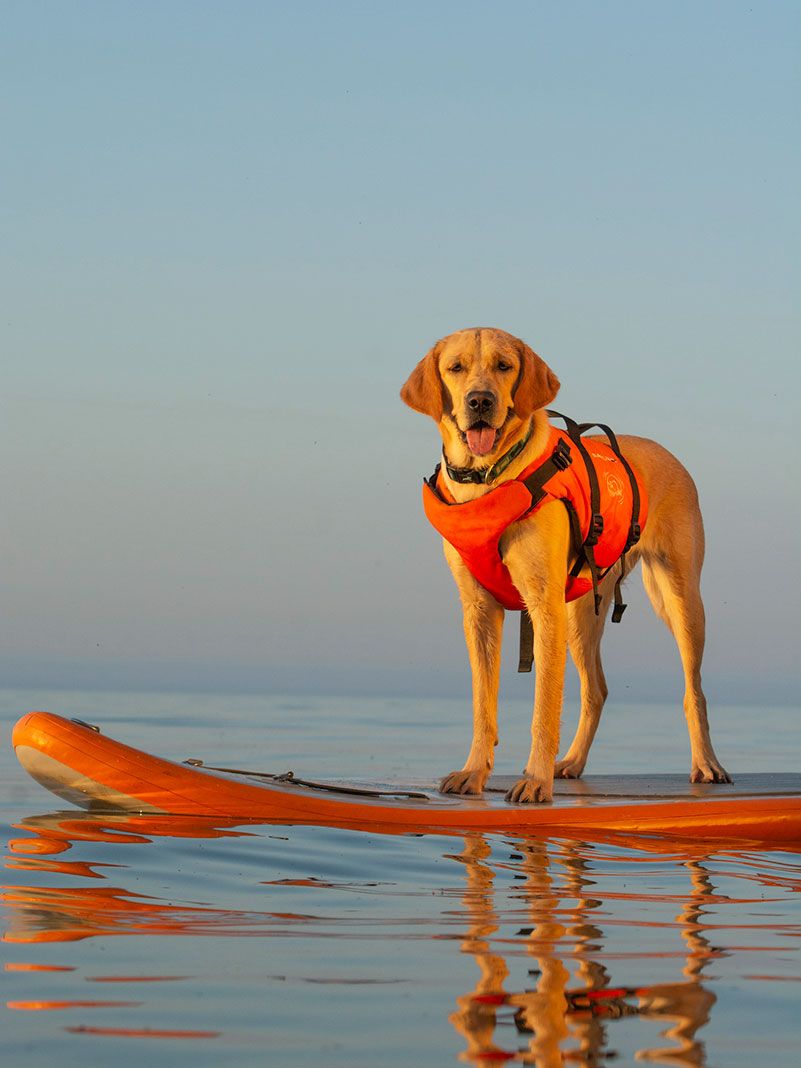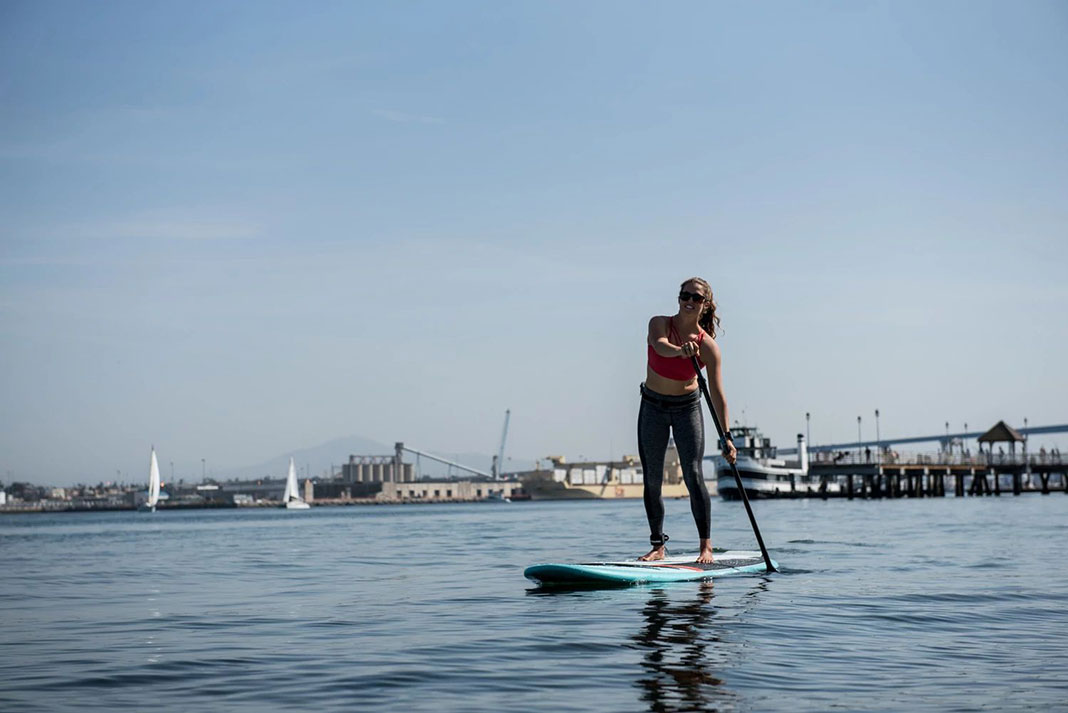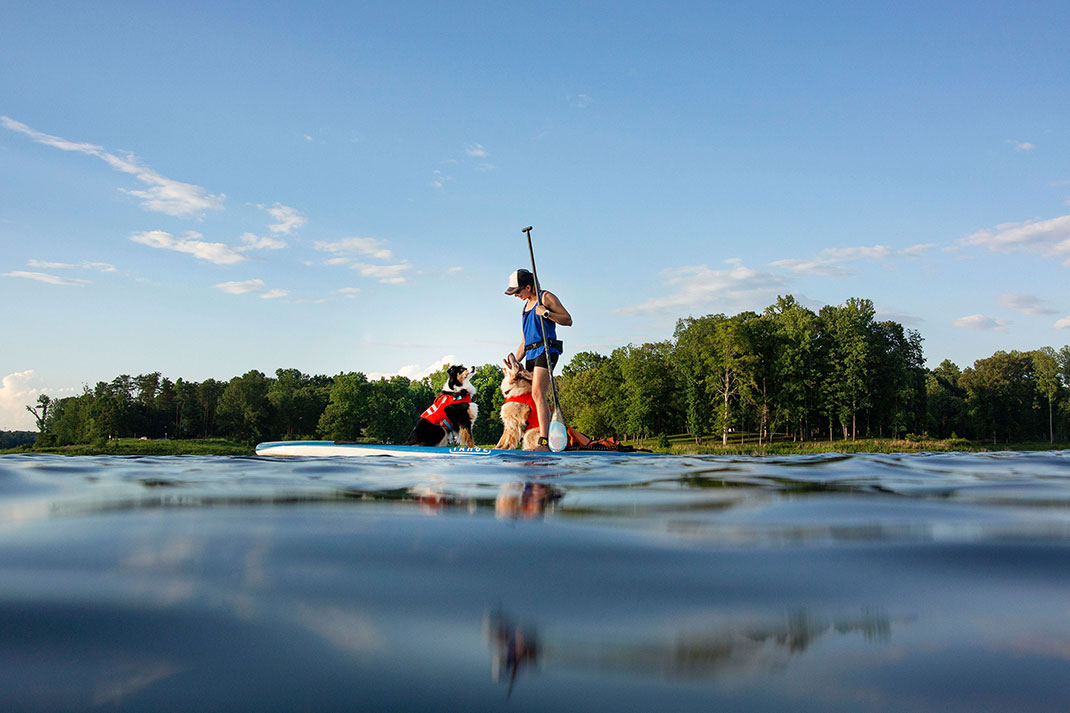Even if you’ve just gotten into paddleboarding, you’ve probably already realized the only way to improve upon a day spent on the water is to bring your best friend along for the ride. Many dogs can be trained to enjoy a ride on a paddleboard, and it’s an excellent way to deepen your bond, have fun and get some exercise together.
Crucial to enjoying a dog paddleboarding adventure is to have a dog-friendly paddleboard. Fortunately, there are many paddleboards suited for this purpose. In this comprehensive guide, we’ll cover everything you need to know about selecting the best paddleboard for your adventures with your pup and answer the most commonly asked questions about paddleboarding with dogs too. This beginner’s-focused buying guide will also cover must-have paddling accessories for dogs, training tips to keep everyone comfortable, and essential safety advice to ensure you both enjoy your next adventure.
Read on to get expert advice on the best SUP type, size and accessories for the ulti-mutt dog-friendly paddleboard adventures.
How to buy a dog-friendly paddleboard
Choosing a board requires careful consideration since the paddleboard you buy will help determine whether or not you and your dog have a fun time on the water. There is no one single best paddleboard for dogs because the best board depends on the type of paddling you like to do, as well as your dog’s size, weight and temperament. From board size and stability to materials and features, here’s what you need to know.
Stability
When selecting a paddleboard for your dog, stability is the top priority. A stable-feeling board will inspire more confidence. All other aspects being equal, a wider paddleboard will provide more stability. However, a wider board will be slower, and a too-wide board can be difficult to paddle. To paddleboard with your dog, look for paddleboards around 32 to 36 inches wide. With a smaller dog, you might be able to opt for a board on the narrower end of that spectrum, while if you have a larger dog you might opt for a board on the wider end.
Weight limit
Capacity is a critical component of an enjoyable paddleboarding experience with your dog. Ensure the capacity of your chosen paddleboard exceeds the total weight when you combine your weight, your dog’s weight and any other gear you’re likely to bring along. If you exceed the capacity of a paddleboard, it will ride low in the water, won’t feel stable and won’t glide efficiently.
Board shape
All-around paddleboards are the most popular type of paddleboard for beginners. All-around paddleboards tend to be 10 to 12 feet long and typically come with a rounded surf-style nose or a slightly pointed touring-inspired nose. A user-friendly, all-around paddleboard is a perfect choice for relaxed days spent paddleboarding with your dog. Paddlers who want to make miles should look to touring board design.
Inflatables vs. hard boards for dogs
Inflatable boards are convenient for storage and transport and incredibly popular. They’re typically made from a soft but tough PVC material, which provides better traction for a dog’s paws and nails and a softer landing if a dog loses its balance and falls on the board. Hard boards can be made from plastic, wood or composite materials. Their rigidity provides extra stability and increased performance, as there is less bend to the board in waves or when a dog or paddler moves around the deck. Learn more about the pros and cons of inflatable paddleboards and hard boards.
Deck padding for dogs
Particularly on a hard board, a deck pad on the top of the paddleboard provides essential traction for your dog. Your dog’s confidence will be greatly enhanced by getting a grip and not sliding around on a slick wood, plastic or composite surface. Look for full-length EVA foam deck pads, which provide good grip. Full-length deck padding isn’t as essential on an inflatable, as the softer construction material provides some traction.
Leash essentials
A paddleboarder should always wear an ankle leash (unless in moving water), which is a cord connecting the board to the paddler’s ankle. This crucial piece of safety gear is even more important when paddling with a dog, as your chances of ending up in the water increase with an excitable pup on board. So, too, do the chances that your board will travel away from you in an upset. Even a light wind can blow a paddleboard away from you, faster than you can swim.
However, a dog doesn’t have to wear its leash on a paddleboard. A well-trained dog shouldn’t need a leash while on a paddleboard, and any dog can be trained to remain in place on the board until released. If your pup is not reliable, you may feel safer leashing your dog. However, never attach your dog’s leash to the paddleboard and never leash your dog in moving water and current.

Dog paddleboard accessories
There are a few essential safety requirements to take your dog paddleboarding. Remember: Always wear your life jacket. Everyone, even strong swimmers, should wear a life jacket at all times when on the water. And just like you, your dog should always wear a life jacket on the water too. Not all dogs are strong swimmers. In particular, dogs with short snouts or short legs, and puppies, older dogs and those with mobility issues tend to be weaker swimmers. Plus, any dog can get tired or panic. Protect your best friend by investing in a dog life jacket. Ensure your dog’s life jacket fits snugly and matches their weight. See our top picks for the best dog life jackets for paddleboarding.
In addition to a PFD for your dog’s paddleboarding adventures, some paddlers opt for a dog mat to put on the deck for extra comfort. Others add a kayak-style seat to their paddleboard. To attach these items, choose a paddleboard with some attachment points designed for accessories. You can also use these attachment points to secure snacks, a water dish and other items.
Training your paddleboarding dog
Dogs are naturally curious and want to explore by your side, so tap into that natural instinct and approach paddleboard training as just another fun adventure together. First, introduce the paddleboard on land, where the dog is comfortable, and allow the dog to investigate it and walk all over it until it’s no big deal.
Next, treat your first few outings to the water as training sessions. Keep these sessions short and filled with positive reinforcement (think soft, stinky dog treats and lots of them!) and only paddle in calm and sheltered conditions to maintain stability and cultivate confidence in your new paddleboarding companion. Always check weather conditions before getting on the water and paddle within your skill level.
Paddleboards for dogs FAQ
Finding a paddleboard to enjoy with your dog doesn’t have to be complicated. Let us help demystify the process. Below are the eight most commonly asked questions about finding the perfect paddleboard for you and your dog.
-
Can dogs go on paddleboards?
Of course! While some dogs may be apprehensive at first, most dogs can be trained to enjoy riding on a paddleboard. It is important to ensure the paddleboard is large enough and stable enough to accommodate the dog’s extra weight. It’s also important to introduce the paddleboard experience gradually—start slowly, always wear your life jacket, always put your dog’s life jacket on her, and provide lots of positive reinforcement to create a fun experience for the dog.
-
Can dogs go on inflatable paddleboards?
Yes, inflatable paddleboards are a great option for dogs. The material inflatable paddleboards are constructed with is not slick like hard boards, and provides good traction for the dog’s paws, which leads to increased comfort and easier reboarding.
-
Can dogs pop inflatable paddleboards?
No. The construction material of a paddleboard from a reputable brand is a world apart from the cheap material of a Walmart pool toy. Don’t worry about your dog’s nails puncturing the board; the material is way tougher than that.
-
Do dogs like paddleboarding?
Not every dog will enjoy paddleboarding, just as not every person enjoys paddleboarding. However, so long as you introduce the activity slowly and with lots of positive reinforcement, most dogs can grow accustomed to the experience of being on the water. Plus, your dog always enjoys being with you. Keep training sessions short and sweet, and make your dog’s safety and comfort your priority.
-
Paddleboard vs. kayak with dog
Both paddleboarding and kayaking can be enjoyable activities to share with your dog. One is not more suitable for bringing your dog along than the other—it just depends on your personable preference. From your dog’s perspective, sitting on the deck of a paddleboard versus sitting on the deck of a sit-on-top kayak is not so different. For dogs who like to swim, a paddleboard may offer easier reboarding. Sitting paddlers may find it easier to manage anxious or excitable dogs.
-
What is the easiest paddleboard to bring your dog on?
A stable-feeling paddleboard is the most important factor in your dog having a good time on the water. Look for a design 10 to 12 feet long, 32 inches wide or more, and with a capacity that exceeds your combined weight. A full-length deck pad will also help ensure your dog’s comfort.
-
What size paddleboard is best for dogs?
The best size of paddleboard for your dog will depend on its size, weight and temperament. Generally, a wider board provides more stability and a longer board provides more space for you and your dog. Larger boards larger weight capacities. Dog paddleboards around 32 inches wide and 10 to 12 feet long are often a good size to start with for small and medium-sized dogs.
-
What happens when a dog falls off a paddleboard?
If your dog falls off your paddleboard and they’re wearing a life jacket, it’s no big deal. Stay calm and encourage your dog back to you and the board, using treats or toys if necessary. If your dog is wearing a leash, you can also use that to guide them back. Use the handles on your dog’s life jacket to assist with reentry onto the board. Once they’re safely back on the board, ensure they’re comfortable. Don’t make a big fuss about the plunge.
Feature photo: Kaydi Pyette





